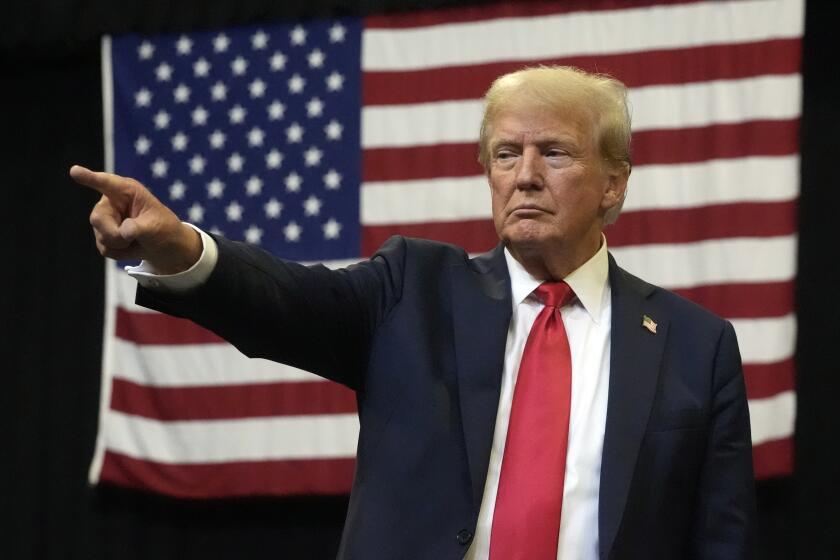Postelection White House meeting underscored Obama’s diminished sway
Three days after the midterm elections, senior Obama aides suggested to a gathering of liberal groups at the White House that they might need to scale back their expectations. In the wake of the big Republican win, there would be no new major legislative pushes from President Obama in 2011.
The mood, according to some participants at the meeting, was dour. Although the White House advisors said job creation would be a central goal, they did not lay out a concrete plan for putting more people to work. “There was an undercurrent of, ‘Hey, folks. We’re going to have to play some defense,’” said one attendee.
Since then, the sense of a president in a crouch has only deepened. Obama was unable to seal a long-anticipated free trade agreement with South Korea during his trip to Asia and was the odd man out at the Group of 20 summit over global economic strategy, where preferences for belt-tightening policies predominate.
When he returns to Washington, he faces an energized Republican opposition. The first issue will be whether to extend George W. Bush-era tax cuts, and Obama is already showing a willingness to compromise on his long-held position that the cuts should expire for families making more than $250,000 a year.
At a news conference Friday in Seoul, Obama bristled at reports that he was caving in to Republican pressure.
“It would be fiscally irresponsible for us to permanently extend the high-income tax cuts,” he said. “I think that would be a mistake, particularly when we’ve got our Republican friends saying that their No. 1 priority is making sure that we deal with our debt and our deficit.”
He added, though, that there “may be a whole host of ways to compromise around those issues.”
Joe Trippi, a longtime Democratic strategist, said Obama “had a lot more power a week ago than he has today, and that’s just a fact. When a president with those kinds of majorities loses the majority in the House, that weakens him in a way where he’s going to have to compromise or get less done.”
Trippi was quick to add, “That doesn’t mean he can’t get his mojo back.” But to some participants at the postelection meeting, the old White House swagger had given way to a more passive hope that Republicans would overplay their hand, especially if the GOP tries to repeal the 2010 healthcare overhaul.
The meeting was attended by senior advisors David Axelrod and Valerie Jarrett, and White House Deputy Chief of Staff Jim Messina, among others. About 50 people were in the room, including representatives from the NAACP and AFSCME, the big municipal employees union. The White House team discussed worrisome exit polls showing that Democratic candidates had not captured the independents who were crucial to Obama’s victory in 2008.
The message was, when it comes to “large-scale legislative things, that their time had passed,” said one participant.
The Obama advisors stressed that the future focus would be job creation, though some participants said they came away from the meeting with no real sense of how the White House intended to cut the 9.6% unemployment rate.
Another attendee said: “The White House people were clear that of course they’ll play defense some of the time, but they’re also the White House and they will exert leadership. Certainly all the groups in the room were quite clear that we look to them to provide that leadership and we want them to be those leaders.”
As part of the ground rules, the White House asked participants not to talk publicly about the meeting, and no one interviewed about it would allow their names to be used.
White House aides declined to comment Friday.
Since coming into power, White House officials have periodically talked strategy with liberal groups, both to explain Obama’s actions and to mobilize support for his policies. Asked why the White House held the Nov. 5 meeting, one participant said: “They knew that there’s concern about what their base is feeling about them. And they know that in order to win you have to figure out how to mobilize the people on the outside who will demand the changes you believe in.”
But adopting a modest legislative course could leave parts of the Democratic base disenchanted.
At the meeting, Axelrod mentioned the importance of the Latino vote in victories in California, Colorado and Nevada.
Whether Latinos turn out for the 2012 presidential contest, though, may hinge on Obama’s willingness to take on just the sort off difficult legislative fight he seems to have forsworn: immigration.
Latinos want him to make good on a campaign promise to push through a comprehensive immigration overhaul that would provide a path to citizenship for those living in the U.S. illegally.
With the House in Republican hands, an immigration bill would stand little chance of passage. Democrats were unable to pass a bill in the last two years when they were in firm control of both houses of Congress. Republican leaders have shown no appetite for a bill providing a path to citizenship for illegal immigrants, and are more focused on tightening border security.
More to Read
Get the L.A. Times Politics newsletter
Deeply reported insights into legislation, politics and policy from Sacramento, Washington and beyond. In your inbox three times per week.
You may occasionally receive promotional content from the Los Angeles Times.










